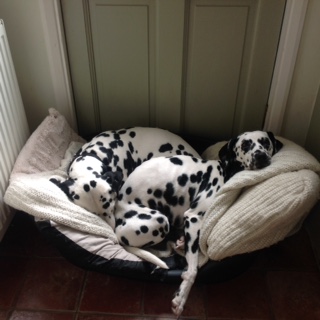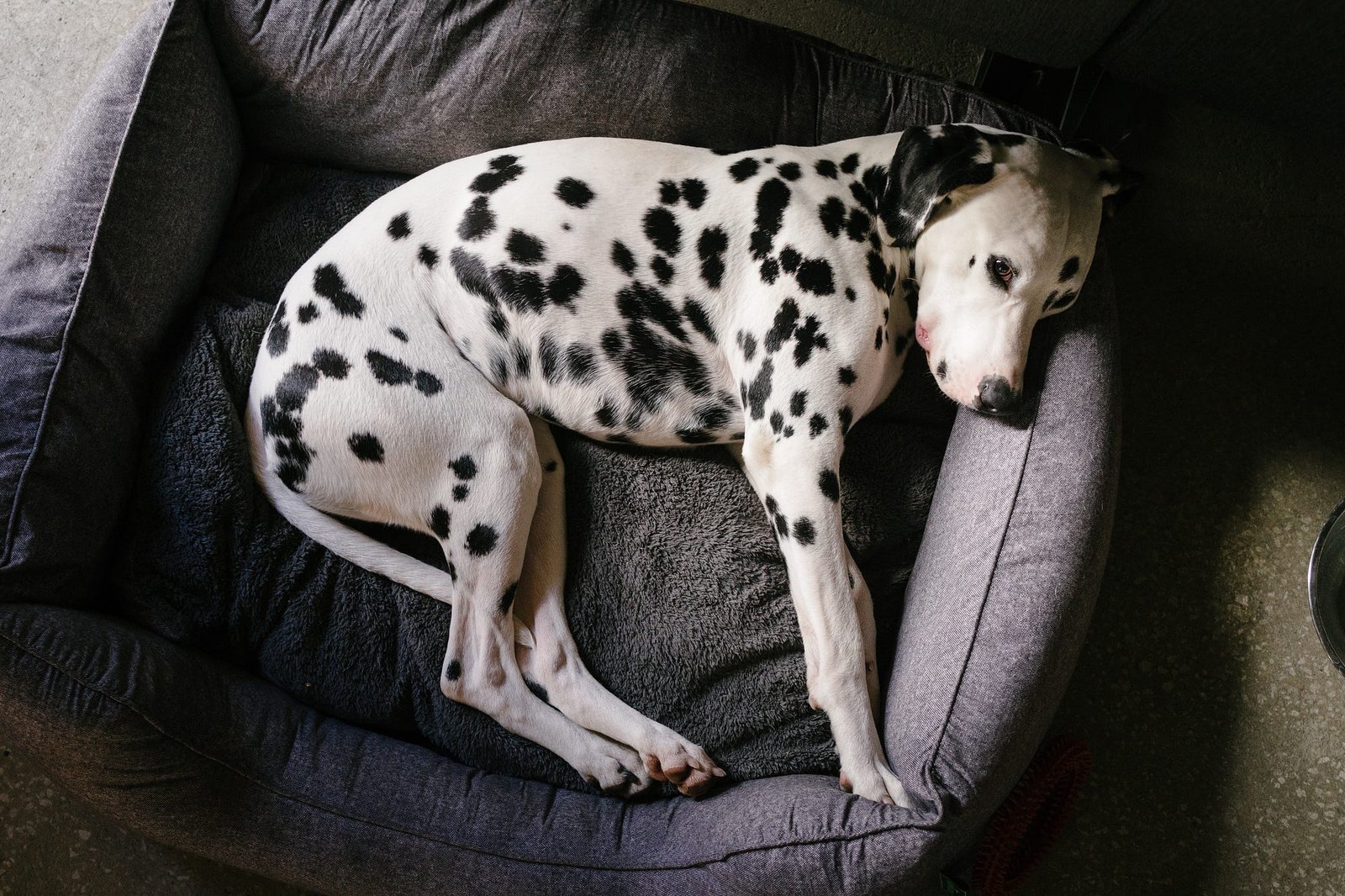Did you know that dalmatians are notorious for their high energy levels? These spotted beauties are known for their lively and energetic nature, but have you ever wondered when they finally calm down?
Dalmatians, known for their energetic and playful personalities, tend to calm down around the age of three to four years. During their puppy and adolescent stages, dalmatians can be quite energetic and require plenty of exercise and mental stimulation to keep them balanced. However, as they reach adulthood, they naturally start to mellow out and become more relaxed. It’s important to provide them with regular exercise, training, and mental stimulation throughout their younger years to help them grow into well-behaved and calm companions. Remember, every dalmatian is unique, so some may calm down earlier or later than others, but patience and consistency are key in helping them become the well-balanced dogs they can be.

When Do Dalmatians Calm Down? Understanding the Developmental Stages of Dalmatians
Dalmatians are known for their high energy levels and lively personalities. However, like all dogs, they go through different stages of development as they grow older. Understanding these stages can help owners know when their Dalmatian is likely to calm down and become more relaxed. In this article, we will explore the various stages of a Dalmatian’s development and provide insights into when they are likely to calm down.
Early Puppyhood: The Energetic Start
Dalmatian puppies are bundles of energy. During the early stages of puppyhood, Dalmatians are curious, playful, and full of mischief. They have boundless energy and can easily become overexcited. At this stage, it is important to provide them with plenty of mental and physical stimulation to prevent destructive behavior. Regular exercise, socialization with other dogs, and training sessions are essential for keeping your Dalmatian engaged and promoting healthy development.
As Dalmatian puppies grow, they start to gain more control over their bodies and develop better coordination. This is the stage where they may start to test boundaries and exhibit more independent behavior. However, their energy levels remain high, and they continue to require plenty of attention and activity. As a Dalmatian owner, it is important to establish routines and provide consistent training to set the foundation for their future behavior.
Adolescence: The Testing Phase
During adolescence, Dalmatians go through a challenging phase. This is usually around the six to twelve-month mark, but it can vary between individuals. Just like human teenagers, Dalmatians in adolescence may exhibit behaviors like stubbornness, testing boundaries, and pushing limits. This is the stage where their energy levels may peak, and they require even more mental and physical exercise.
It is vital for owners to stay consistent with training and provide outlets for their Dalmatians’ energy. Engaging in activities such as obedience training, agility, and structured playtime can help channel their energy constructively. Patience and understanding are key during this phase, as it is temporary, and your Dalmatian will begin to mature and calm down as they reach adulthood.
Adulthood: Finding Balance and Maturity
As Dalmatians reach adulthood, usually around 18 months to 2 years of age, they start to settle into a more balanced state. While they may still have bursts of energy, they become more manageable and easier to handle. The high energy levels of their puppyhood and adolescence begin to level off, and they become more focused and obedient.
At this stage, regular exercise and mental stimulation are still crucial for maintaining their well-being, but the intensity can be toned down compared to their earlier years. Dalmatians are highly intelligent dogs, and providing them with puzzles, games, and interactive toys can help keep their minds sharp and prevent boredom.
Remember, every Dalmatian is unique, and individual variations may occur. The timeline for when a Dalmatian calms down can differ based on their genetics, environment, and training. Proper socialization, positive reinforcement training, and providing a loving and structured home environment are key factors in raising a well-behaved and balanced Dalmatian.
Factors Influencing Calmness in Dalmatians
Genetics
The genetics of a Dalmatian play a significant role in determining their energy levels and temperament. If both parents of your Dalmatian have calm personalities, there is a higher chance that your Dalmatian will also exhibit a more relaxed demeanor. However, it is important to note that genetics are not the sole factor and can be influenced by other environmental factors.
Environmental Factors
The environment in which a Dalmatian grows up plays a crucial role in their behavior and energy levels. A stimulating and structured environment, with consistent rules and routines, can help a Dalmatian develop into a well-behaved and calm adult. On the other hand, a lack of mental and physical stimulation, inconsistent training, and unstable living conditions can contribute to hyperactivity and restlessness.
Training and Socialization
Proper training and socialization are vital for a Dalmatian to grow into a well-behaved and calm adult. Early exposure to various people, animals, and environments helps them become more confident and adaptable. Positive reinforcement training techniques that reward desired behaviors and discourage unwanted ones can also contribute to a calmer demeanor. Consistency and patience in training are key to shaping a Dalmatian’s behavior.
Nutrition and Health
A balanced and nutritious diet plays a significant role in a Dalmatian’s overall well-being and energy levels. Providing them with high-quality dog food that meets their nutritional needs is important for their development and can help them maintain a stable energy level. Regular veterinary check-ups and proper healthcare, including vaccinations, parasite prevention, and dental care, ensure that any underlying health issues are addressed promptly, contributing to their overall calmness.
The Benefits of a Calm Dalmatian
Having a calm Dalmatian can bring numerous benefits to both the dog and its owners. A calmer Dalmatian is generally easier to train, making it a more enjoyable and rewarding experience. It also means that they are better suited for various activities, such as therapy work, obedience competitions, or simply being a well-behaved and balanced family pet.
A calm Dalmatian can also adapt more easily to different living situations, such as apartments or houses with smaller yards. They are less likely to exhibit destructive behaviors, such as excessive digging or chewing, when they are content and relaxed. Additionally, a calm Dalmatian can be more inclined to form strong bonds with their family members, providing companionship and support.
As a Dalmatian owner, it is important to remember that each dog is unique and may have its own timeline for calming down. Patience, understanding, and consistent training are essential throughout their development. Embrace the energetic and playful nature of your Dalmatian during their early years while providing the guidance and structure they need to grow into a calm and balanced adult.
When do Dalmatians calm down?
- Dalmatians usually start to calm down around the age of 2 to 3 years old.
- Regular exercise and mental stimulation can help Dalmatians calm down faster.
- Training and socialization from an early age can also contribute to a calmer Dalmatian.
- Spaying or neutering your Dalmatian can have a calming effect on their behavior.
- Patience and consistency are key in helping Dalmatians calm down over time.
Frequently Asked Questions
Welcome to our FAQ section on when dalmatians calm down! If you’re curious about the behavioral patterns and temperament of these beautiful dogs, you’re in the right place. Below, we’ve provided answers to commonly asked questions regarding the calmness of dalmatians.
Do dalmatians calm down as they get older?
Yes, as dalmatians mature, they tend to calm down. Like many dog breeds, dalmatians experience a natural progression in their energy levels as they age. Dalmatian puppies are known for their energetic and playful nature, but as they grow older, they become more relaxed and develop a calmer demeanor.
However, it’s essential to note that individual variations can exist within dogs of the same breed, so while most dalmatians do calm down with age, there may still be some that retain their high energy levels throughout their lives.
What are some signs that a dalmatian is starting to calm down?
As dalmatians begin to calm down, you may notice certain signs indicating the shift in their energy levels. One common sign is a decrease in hyperactivity and restlessness. They will exhibit a more laid-back approach to activities, becoming less inclined to jump, bark excessively, or exhibit constant movement.
Another sign is the ability to settle down and relax for longer periods of time. Calming dalmatians may prefer lounging or snoozing on the couch rather than constantly seeking attention or engaging in high-energy play. These changes can often be observed as they transition from puppyhood to adulthood.
At what age do dalmatians typically calm down?
Dalmatians typically begin to calm down around the age of two to three years. During this stage, they have passed their adolescent phase and have started to mature both physically and mentally. While they may still have bursts of energy and playfulness, they generally become less hyperactive and more relaxed.
It is important to note that every dalmatian is unique and may have their own timeline for calming down. Some dalmatians may start showing signs of maturity earlier, while others may take a bit longer. Patience and consistent training are key during this period of transition.
How can I help my dalmatian calm down?
To help your dalmatian calm down, there are several strategies you can employ. Regular exercise is crucial for burning off excess energy, so ensure your dalmatian receives daily walks, runs, or play sessions. Mental stimulation through puzzle toys or training activities can also help redirect their energy.
Consistent obedience training is essential in teaching your dalmatian self-control and proper behavior. By providing clear boundaries and consistent reinforcement, you can guide them towards a calmer demeanor. Additionally, maintaining a calm and stress-free environment at home can greatly contribute to their overall relaxation.
Are there any health factors that may affect a dalmatian’s energy levels?
Yes, certain health factors can affect the energy levels of dalmatians. For example, underlying medical conditions such as thyroid problems or allergies can cause increased restlessness or hyperactivity. It is important to consult with a veterinarian if you notice any drastic changes in your dalmatian’s energy levels or behavior.
In addition to medical conditions, the overall health and well-being of a dalmatian can impact their energy levels. Proper nutrition, regular vet check-ups, and a balanced lifestyle can contribute to a more harmonious temperament. Ensuring that your dalmatian receives the necessary vaccinations and preventative care can also greatly influence their energy levels and overall calmness.

Summary
Dalmatians are energetic puppies, but they do calm down as they grow older. It is important to understand that each dog is unique, and the timing of their calmness may vary. The main factors that influence when Dalmatians calm down include their genetics, environment, training, and exercise. Providing them with proper socialization, mental stimulation, and physical activity can help them to relax and become more well-behaved. Patience and consistency in training are key to helping Dalmatians settle down and become great companions for both kids and adults. Remember, it’s all about giving them the love and care they need as they mature into their roles as adult dogs.
